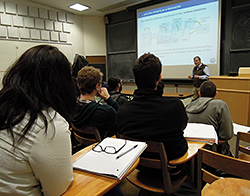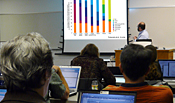You are here
Pacific University and CMOP Partner to Offer Biomathematics Workshop
01/08/14 Portland, Ore.

Dr. Baptista kicks off workshop.
"Applied mathematics and computational science provide the other natural sciences with important tools for analyzing data and modeling complex systems," said Dr. Ian Besse, Pacific University assistant professor of mathematics and lead instructor of the workshop. "As the natural sciences become progressively more quantitative, the development of a workforce that can skillfully wield these tools, becomes increasingly important."
The course consists of several modules designed around a real-world mathematical modeling problem related to the emergence of red algae blooms in the Columbia River estuary. It is taught in a workshop format with class time divided between lecture sessions, during which the mathematical, computational, geophysical and biochemical aspects of the problem are introduced, and breakout sessions, during which student work in teams engaged in the task of generating a solution to the real-world problem.
Topics will include differential equations, numerical methods, time series analysis, MATLAB programming, biological aspects influencing algae blooms, physical aspects influencing algae blooms, general biogeochemistry of the Columbia River estuary, and tribal history and law related to the Columbia River estuary. This course will require students to spend a substantial amount of time outside of class working on mini-projects in groups and reading supplementary material.
The goals are to provide students who are mathematically and computationally fluent with the opportunity to:
- Add to the breadth of their applied mathematics skills,
- Work on a real-world modeling problem, and
- Encourage strong students to consider academic and career paths that lead them into the interface between the physical sciences, the biological sciences, and mathematics.
CMOP, a multi-institutional center of excellence hosted at Oregon Health & Science University's Institute of Environmental Health, utilizes many sophisticated mathematical and computational methods in their modeling and data analysis efforts related to complex biogeochemical systems. The Pacific University Mathematics Program recently revamped its major to include a biomathematics specialization in order to more effectively serve majors who are interested in mathematical applications within the biological and life sciences.
"The partnership between the two provides Pacific University students with opportunities to strengthen their understanding of applied mathematical methods and offers an ideal complement to the new biomathematics specialization," Besse said.
Written by Jeff Schilling






